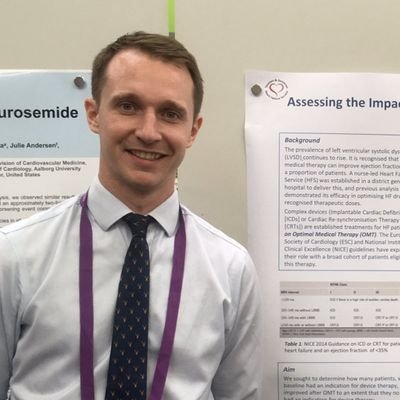
Dylan Thompson
@DrDylanThompson
Followers
1K
Following
2K
Media
74
Statuses
922
Professor, Physiologist at the University of Bath, UK https://t.co/ApEktzPf24. Views are my own.
Joined June 2013
Our latest paper, led by @jgraby explores how CTCA reclassifies atheroma burden vs CAC and how this impacts Rx. It also highlights variability in active peri-coronary inflammation across a lipid clinic cohort with @CaristoHeart analysis.
1
2
4
Interested in physical activity interventions? Have you considered the effect of physical activity substitution? We examined this overlooked and neglected issue in our new paper⬇️ @CNEM_Bath
https://t.co/tKW4ZjYK7s
dom-pubs.pericles-prod.literatumonline.com
Aims When exercise is prescribed, the new exercise could ‘substitute’ for pre-existing physical activity such that the net effect on energy expenditure is less than predicted. However, the impact...
2
10
29
Caveat: This is based on modelling and shows the POTENTIAL for substitution. We propose some suggestions for how this could be explored further - and how it could potentially be exploited to increase the net effect of interventions. Take a look and see what you think.
0
1
2
In extreme cases, some people could even be worse off (at least in LOW). Thus, variation in studies like HERITAGE ( https://t.co/OPJGtXy0JP) might be partially caused by heterogenous substitution (not just genetics).
1
1
3
Substitution will also introduce treatment response heterogeneity. Thus, even if you deliver an IDENTICAL intervention to a group people, the NET effect at the individual level WILL BE VARIABLE after accounting for substitution.
1
1
2
So, if energy expenditure increases less than predicted during exercise interventions, this might NOT be because of biological or behavioural compensation. It could be due to substitution.
1
1
3
Thus, physical activity substitution can explain why energy appears to ‘go missing’ during prescribed exercise interventions/trials, even when the structured exercise has been supervised (e.g., https://t.co/Bpe0aE5aX7)
1
1
2
In the LOW prescribed exercise scenario, people only got 40% of what would be predicted under an additive model (on average).
1
1
4
We modelled two different prescribed exercise scenarios (LOW and HIGH) in ~250 people. We used modelling to overcome spatiotemporal methodological challenges
1
1
1
Our new paper shows that substitution has the potential to strongly erode the theoretical increase in energy expenditure during exercise interventions. The effects can be ENORMOUS!
1
1
1
Instead, the new physical activity may sometimes ‘substitute’ for pre-existing physical activity such that the net change in energy expenditure is not what would be predicted based on the addition of new prescribed (interventional) gross energy expenditure.
1
1
2
When new physical activity is introduced, the new PA (e.g., prescribed exercise) will be superimposed against the background of pre-existing daily life. Thus, pre-existing/baseline energy expenditure at the time of the new physical activity will not always be equivalent to rest.
1
1
1
Interested in physical activity interventions? Have you considered the effect of physical activity substitution? We examined this overlooked and neglected issue in our new paper⬇️ @CNEM_Bath
https://t.co/tKW4ZjYK7s
dom-pubs.pericles-prod.literatumonline.com
Aims When exercise is prescribed, the new exercise could ‘substitute’ for pre-existing physical activity such that the net effect on energy expenditure is less than predicted. However, the impact...
2
10
29
RACMEM 2025 Shenzhen 13th to 17th Oct 2025 BIG announcement number ONE Because we have met our fund raising targets for the meeting we have decided to scrap all registration fees for scientific contributors. Fees for industrial sponsors beyond those provided in the sponsor
racmem.org
Recent Advances and Controversies in the Measurement of Energy Metabolism
1
8
18
Great to be in Madrid @escardio with our @RUHBath cardiology research team @Murphyjdave & @JoAbr90 sharing our work on Super Rehab, cardiac CT and microvascular angina - @JCLRodrigues @DrAliKhavandi @DrDylanThompson @fbgillison
1
2
6
This doesn’t mean that the gut microbiome is not important for metabolic health. It just means that it is unlikely that the initial benefits of weight loss are dependent on changes to the gut microbiome.
0
0
6
These findings indicate that early metabolic changes with weight loss in humans are unlikely to be mediated by changes to the gut microbiome.
1
0
5
We found that the human gut microbiome remains unchanged in the face of an intensive energy restriction and exercise intervention that markedly improved body composition and metabolic health in people with overweight/obesity.
1
0
2
Importantly, people did not change dietary composition during the intervention - they just consumed less of their normal foods. We also examined circulating short-chain fatty acids, and expression of genes related to host-microbiome interactions in muscle and adipose tissue.
1
0
3
Surprisingly, there have been limited attempts to address this question using RCTs. In this new paper, we examined if a 3-week energy restriction and exercise intervention was temporally associated with changes to gut microbiome taxonomic composition and functional potential.
1
0
2





